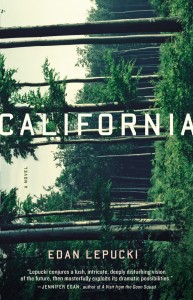THERE’S been so much bad news as the online Goliath has crushed bookstores and tangled with publishers, that it’s nice to see a bit of silver lining. Two new developments make us smile a bit here at CultureCrash, where we are too often locked into a grim expression.
First, a talented first-time novelist has received an unlikely bounce from Stephen Colbert, who used Edan Lepucki’s new book as an example of the battle’s stakes. Reports the New York Times:
“We will not lick their monopoly boot,” he said of Amazon on “The Colbert Report” before exhorting viewers to preorder Ms. Lepucki’s post-apocalyptic “California” from independent bookstores. The Amazon-Hachette brawl, Mr. Colbert explained, “is toughest on young authors who are being published for the first time.”
This is a great stroke of luck for Lepucki, of course. But I read the book a few months ago, before it came out — I interviewed her for a panel on California literature — and have known her casually for a little while. (She and her husband were clerks at Book Soup in West Hollywood when I lived nearby; truly good people.) So I’ll say: While she was as unsure as most first-time novelists, it didn’t take a genius to see that this post-apocalyptic domestic novel could easily catch on. I’m glad it has.
More broadly: European nations have done a more assertive job at fighting back against Amazon; they’ve got a longer experience defending what they see as their heritage, and have faced up to the damage created by a raw, unregulated cultural marketplace. The French government has now passed a bill to protect small bookstores against online booksellers, Amazon reports:
This new law has roots in the “Lang Law,” which was passed back in 1981. As part of that law the French minister of culture established a fixed price on books in order to aid independent bookstores competing with giant retailers, reports TechCruch. Similar laws then cropped up all over Europe — including in Italy, Portugal, Spain and Germany… According to Raw Story, France is particularly proud of its network of bookstores, calling them “unique in the world.”
No we Americans are heading into a holiday to celebrate what makes out nation great. Sadly, though the USA has produced many great writers, publishing houses, even bookstores, we’ve not done a terribly good job protecting them. Let’s hope we learn as we see how the world is changing.
And wishing all CultureCrash readers a good 4th and a restful holiday weekend. I will be partaking of some of my favorite American traditions — drinking what I expect will be a California wine as we watch Steve Martin lead his bluegrass band at the Hollywood Bowl.


It is sometimes interesting to analyze cultures through the concepts of cultural isomorphism – the idea that segments or layers of society such as the economy, religion, politics, technology, educational systems, intellectual life, and the military all interact and gravitate toward common beliefs. In culturally isomorphic systems, the largest and most powerful institutions have significant, if indirect, influence over smaller institutions, not so much through force, but through pervasive and often unconscious forms of moral suasion.
Examples might be how the arts world moves toward a common ground with the massively powerful entertainment industry, or how scientific research falls increasingly under the purview of the military; or how religious and moral ideals adapt to justify a government’s actions; or how financial interests and concepts of law become increasingly unified.
One of the military’s core concepts is full spectrum dominance. The goal is complete control of the air, land, maritime, space, and cyber domains to permit the conduct of operations without effective interference. I think that in the global village, it is inevitable that economic, moral, legal, and technological theories will evolve that are culturally isomorphic with the military’s concept of full spectrum dominance.
From this perspective, odd as it might be, the full spectrum dominance of institutions such as Wal-Mart and Amazon seem only natural. We might rightfully see this as rather totalitarian, but future generations will likely accept it as a norm. They’ll just want to click and get what they want. They won’t care about the means.
Under these conditions, democracy will increasingly become a simulation, a form of televised irony, a smirk on the face of physical comforts. Colbert will say, “We will not lick their boots.” Then we’ll feel better. Click.
Happy 4th of July.